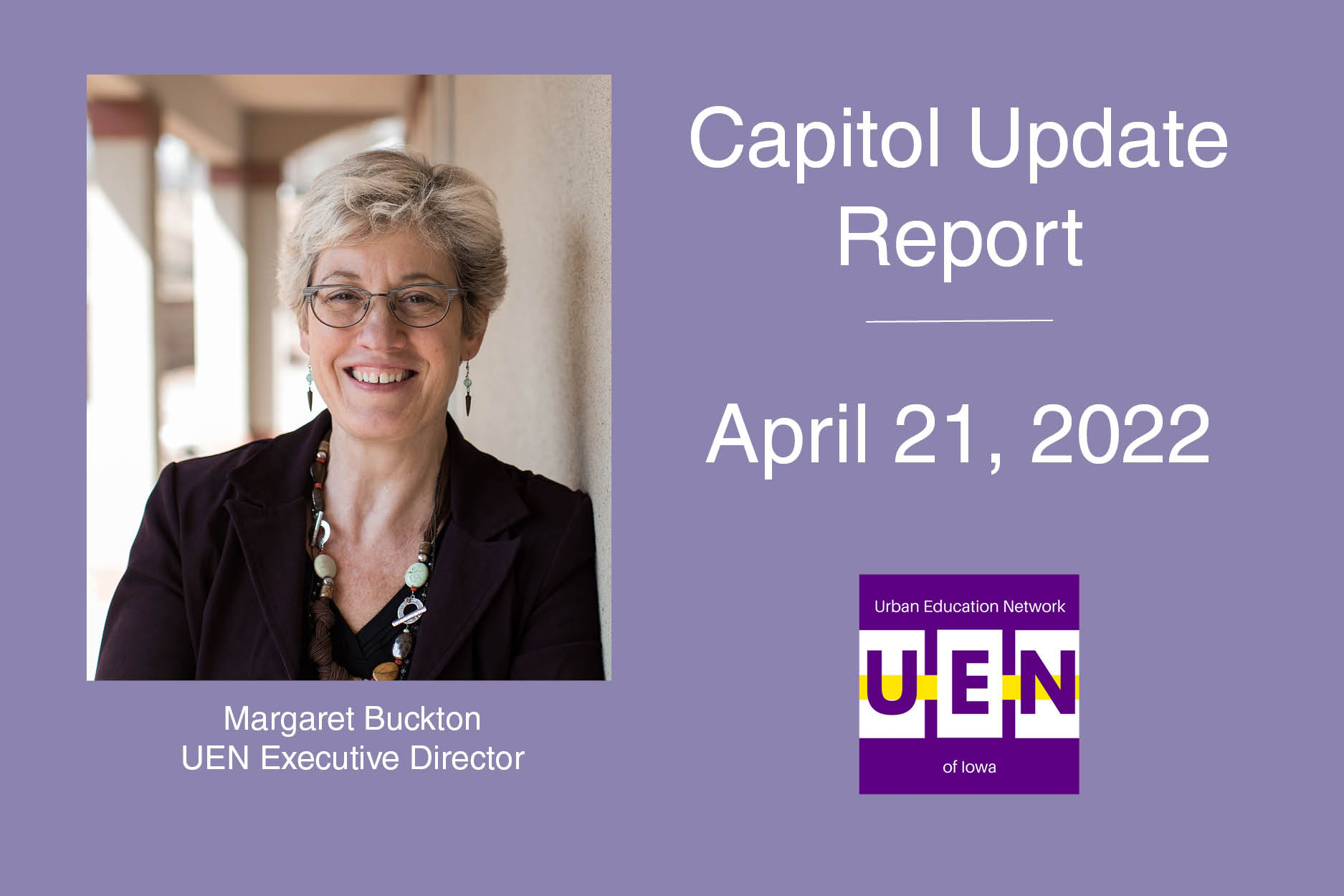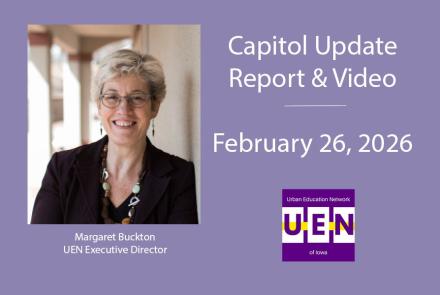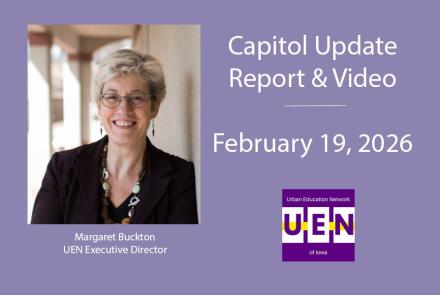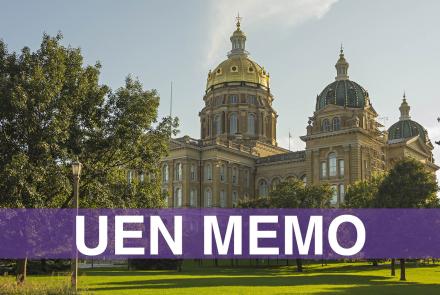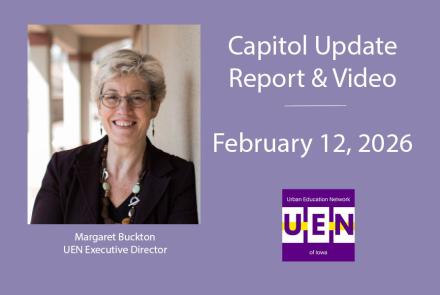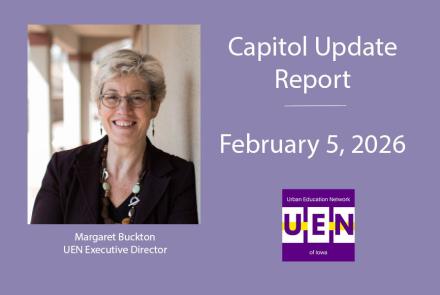Capitol Update - April 21, 2022
UEN Legislative Update
April 21, 2022
Week Fifteen of the 2022 Session: Budget and Policy Impasses really slows down the work. It is unknown when they will return to finish up the Session. Budget bills are on hold in the Senate until agreements are made on the pending policies. This UEN Weekly Report from the 2022 Legislative Session is short as we are awaiting action.
- Note about SF 2369 Governor’s School Choice/Voucher Omnibus
- Appropriations Bill Status and Superintendent Severance Limitations in the Senate
- Advocacy Actions and Links to Advocacy Resources
SF 2369 Governor’s School Choice/Voucher Omnibus: this bill is still in the House Appropriations Committee without a subcommittee assigned. See the March 31 report for all of the details, including the Parents’ Rights Provisions and Policies to Address Teacher Shortages amended onto the bill.
We have heard that the Governor is scheduling meetings around the state to talk with legislators and constituents about her proposal. If you receive such an invitation and would like a review of the proposal or advocacy materials, please contact us. In the meantime, if you are at legislative forums or connecting with your Representatives and Senators, the talking points in the March 31 UEN School Choice Call to Action are still relevant.
The IALNS Newsletter Reported on April 21:
The differences in education proposals seem to be the biggest stumbling block to adjournment. Both chambers have approved competing bills on education transparency, on largely party-line votes. The House bill, HF 2577 EDUCATION PROPOSALS, and the Senate bill, SF 2369 GOVERNORS EDUCATION PROGRAM, both require that syllabi and class materials be posted online. The Senate version adds a “Parental Bill of Rights” and has more stringent requirements on posting and materials. The cost of implementing the House provisions are estimated at about $16 million, largely due to the need to hire additional substitutes to cover classroom time while teachers prepare materials to meet the new requirements. The costs for the Senate provisions are estimated at about $27 million. On the Senate floor, the Senate also added provisions to expand mandatory reporting of child abuse in schools.
The biggest difference between the two chambers is the cost of the new Student First scholarships, approved in the Senate and supported by Governor Reynolds, who made it a priority for this Session. If 10,000 students take advantage of the scholarships, the cost is estimated at about $55 million. Overall, the drop of enrollment would reduce state funding to schools by about $79 million, which would be partially offset by about $24 million for small schools (districts with an enrollment under 500).
As of today, the House does not have the votes to pass the scholarship provisions. The exact number of Republicans opposed to the provisions is unknown, but several House Republicans have said publicly that they do not support the Student First scholarships. Reasons include a preference for keeping the funding in the SSA for schools, concerns that rural Iowa lacks private schools that can benefit from the new provisions and that the scholarship money will go to large counties and a desire to see the impact of the tax cuts approved this year before reducing state public school aid.
Status of Appropriations: the following table, also from the IALNS Bulletin, April 21, 2002, shows the progress of appropriations bills, all of which have been approved by the House with no action in the Senate but for the Transportation, Infrastructure and Capitals bill. The only remaining budget bill not discussed in the House is the Standings Appropriations bill, which includes state foundation aid, typically introduced as the last budget bill of the Session.
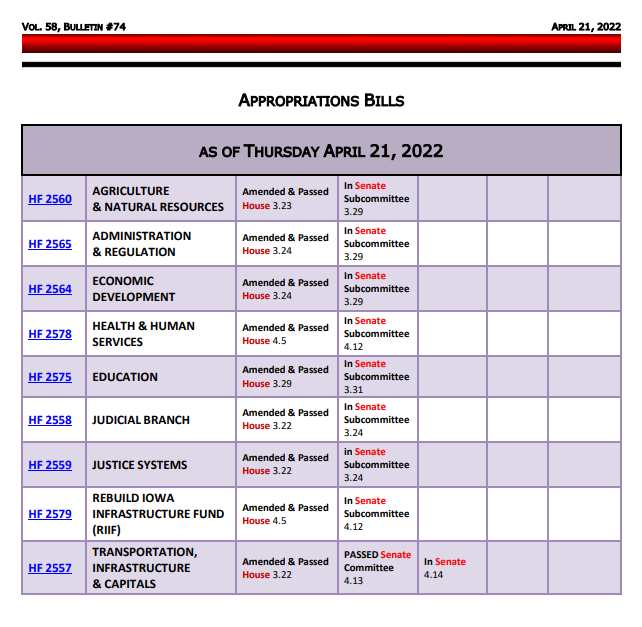
See the March 31 UEN Weekly Report for details of the Education Appropriations Bill HF 2575. One specific detail worthy of mention: Division X of HF 2575, amended onto the bill in the House, would have prohibited school boards from giving an outgoing superintendent severance pay exceeding three months of salary. Sen. Cournoyer, chair of the Senate Education Appropriations Committee, has told us that she intends to remove that provision from the bill in the Senate.
Advocacy Actions This Week, no Change from Last Week:
- Watch your email for announcements if policies pop up that need quick outreach to legislators: As the Session winds down, we’ll keep you in the know.
- Ask House members to resist SJR 2006 Constitutional Amendment on Tax Policy.
- Send a note to your legislators: As most are home awaiting the announcement of leadership compromises, this is a good time to circle back and reinforce your local connections. Thank them for working on teacher shortage policies, improving the transparency requirements to what’s workable, and for being there to represent you and your district. If they had committed to you their opposition to vouchers, you could thank them for that as well.
Find Representatives here: https://www.legis.iowa.gov/legislators/house
Find Senators here: https://www.legis.iowa.gov/legislators/senate
- Check out your new legislative district and primary candidates for the Nov. 2022 election. Enter your address in this new map lookup tool on the legislative website to confirm your House and Senate district numbers: https://www.legis.iowa.gov/legislators/redistricting. Find names, phone numbers and home email addresses for primary candidates on the Iowa Secretary of State’s website, which publishes this information in a pdf found here: https://sos.iowa.gov/elections/pdf/Candidates/primarycandidatelist.pdf. Call them or send them a note, introduce yourself, offer to be a resource for them on education issues, and let them know what they can do to best represent and support the students, families and staff in your school district.
Connecting with Legislators at the Statehouse: To call and leave a message for a Senator, call the Senate switchboard operator number is 515.281.3371. To call and leave a message for a representative, the House switchboard operator number is 515.281-3221. You can ask if they are available or leave a message for them to call you back. You can also ask them what’s the best way to contact them during Session. They may tell you email, text message or phone call is the best way to connect with them during the Session, based on their personal preferences.
UEN Advocacy Resources: Check out the UEN Website at www.uen-ia.org to find Advocacy Resources such as Issue Briefs, UEN Weekly Legislative Reports and Weekly Capitol Video Updates, UEN Calls to Action when immediate advocacy action is required, testimony presented to the State Board of Education, the DE or any legislative committee or public hearing, and links to fiscal information that may inform your work. The latest legislative actions from the Statehouse will be posted at: www.uen-ia.org/blogs-list. See the 2022 UEN Advocacy Handbook, which is also available from the subscriber section of the UEN website.
Contact us with any questions, feedback or suggestions to better prepare your advocacy work:
Margaret Buckton
UEN Executive Director/Legislative Analyst
margaret@iowaschoolfinance.com
515.201.3755 Cell


